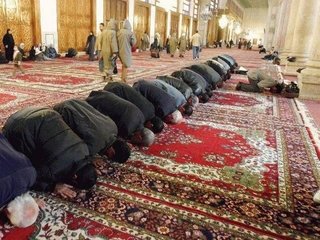To Muslims, Islam is the original monotheistic faith from Adam to Jesus, with Muhammad as the last prophet of God, Allah. Muhammad collected the teachings of God in the Qur’an.¹ Islam is the second largest religion in the world.¹ There are five pillars of Islam, which include¹:

- Testimony – there are no other Gods but Allah and Muhammad is his Messenger.
- Prayer – Salat (ritual prayer) is to be performed five times a day.
- Alms-giving – Zakat is giving to those who are poor and in need.
- Fasting – During Ramadhan no food or drink should be consumed from dawn to dusk.
- Pilgrimage – at least once in a Muslim person’s life, during the Islamic month of Dhu al-Hijjah, a pilgrimage to Mecca is expected.
Caliphs are the heads of state in Muslim communities and are considered the successors of Muhammad.¹
On those who believe and work deeds of righteousness, will (Allah) Most Gracious bestow love. [19:96]
There are two main denominations in Islam²:
Sunni – The largest group, which believes that caliphs are chosen based on righteousness and not birth.
Shia – They believe that Muhammad chose his nephew to be his successor, who was the first Imam (leader of the Muslim people).
While Islam identifies Jesus as a prophet of God, it does not recognize the idea of the trinity that Christians believe in. God is one, and he is a personal God that Muslims can call upon directly.² Muslim people believe in predestination; that Allah knows and controls all that happens. They also believe in a day of resurrection, when all people will be judged on their actions, good and bad.² The Qur’an is a collection of God’s revelations to Muhammad, a guide to how Muslim people should live.
Image source:
1. Antonio Melina/Agência Brasil
References:
1. The Religion of Islam. Retrieved May 22, 2014, from http://www.islamreligion.com
2. The Economist. What is the difference between Sunni and Shia Muslims? Retrieved May 22, 2014, from http://www.economist.com/blogs/economist-explains/2013/05/economist-explains-19
© BrainMass Inc. brainmass.com June 30, 2024, 9:20 am ad1c9bdddf